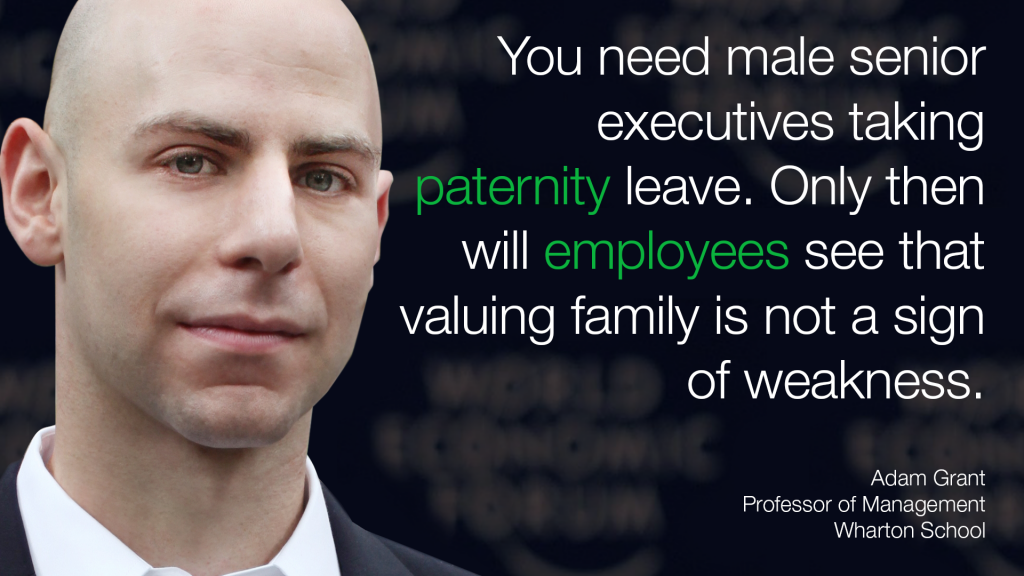Mark Zuckerberg and 5 other men who put family first

Stay up to date:
Future of Work
Mark Zuckerberg, the CEO of Facebook, has reignited the debate about gender roles and work by announcing he will take two months of paternity leave for the birth of his daughter.
The fact that his decision prompted such a slew of headlines shows what a novelty it still is for high-profile male leaders to publicly put family commitments above their careers.
This is despite the numerous benefits of paternity leave: it helps to close the gap between men and women at work, which at current rates will take 118 years to eradicate; it sets fathers up to play a more active role as their children grow; and it ultimately helps children to flourish. (Find out how your country fares on the gender-equality front, via our Gender Gap Calculator.)
‘I cannot and will not give up my family time’
Facebook’s leader may have raised eyebrows, but he is not alone. Only last month Paul Ryan, current Speaker of the US House of Representatives, generated headlines when he remarked that: “I cannot and will not give up my family time.”
Such high-profile cases could signal a broader cultural shift. As Adam Grant, a Professor of Management at Wharton who has argued for changes to working life, put it: “You need male senior executives taking paternity leave, and showing that they see themselves first and foremost as a father and a husband. Only then can we expect employees to look up the hierarchy and perceive that valuing family is not a sign of weakness that will detract from their career.”
Elsewhere in the business world, Chad Dickerson, CEO of the online marketplace Etsy, took nine weeks off when he adopted his son. Blake Mycoskie, the founder and CEO of Toms Shoes, took 12 weeks off, telling CNN:
If a dad doesn’t take it or isn’t offered it, he’s tired. He’s distracted. He’s probably making bad decisions for the business, and he’s feeling guilty he’s not at home.
And it hardly needs to be said that Zuckerberg isn’t the only leader at Facebook who’s pushing for change in this area. Sheryl Sandberg, Chief Operating Officer, launched a whole movement for women to get ahead in the form of her Lean In campaign, while Tom Stocky, the company’s Vice President of Search, took four months of paternity leave and wrote about it in this much-discussed post:
It’s with mixed emotions that I go back to office work tomorrow. I love that job, so I’m excited to get back into it, and I’m curious to see if any elements of people’s career concerns about my 4-month absence have played out at all. But I also know that I’m going to miss my daughter terribly, and I already feel guilty that I’m a bad parent for spending so much less time with her.
A working father wrestling with guilt? Perhaps we’re getting closer to gender parity after all.
Have you read?
Which countries offer the most paternity leave?
Why paternity leave alone won’t close the gender gap
The 10 most gender-equal countries in the world
Author: Ceri Parker is a Commissioning Editor for the World Economic Forum Agenda
Don't miss any update on this topic
Create a free account and access your personalized content collection with our latest publications and analyses.
License and Republishing
World Economic Forum articles may be republished in accordance with the Creative Commons Attribution-NonCommercial-NoDerivatives 4.0 International Public License, and in accordance with our Terms of Use.
The views expressed in this article are those of the author alone and not the World Economic Forum.
Related topics:
Forum Stories newsletter
Bringing you weekly curated insights and analysis on the global issues that matter.
More on Equity, Diversity and InclusionSee all
Zainab Azizi
April 9, 2025
Jon Jacobson
March 27, 2025
Andrea Willige
March 26, 2025






